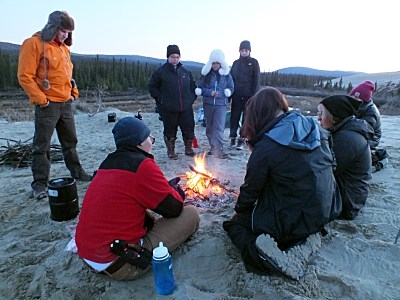
Susan Schmidt/NPS Photo Fumble, Stumble, MumbleAn ever present danger in cold climates is hypothermia, a condition created when you lose body heat faster than you create it. Early symptoms of hypothermia include slurred speech, trembling, exhaustion, stumbling, and impaired judgment. Unchecked, symptoms may progress to mental confusion, unconsciousness, and eventually death. Hypothermia can result from cold ambient temperatures between 30 and 60 degrees F, especially when accompanied by wind or rain. Should you get wet, you must be aware that hypothermia will likely follow. Take Preventative ActionPut on rainwear or warm clothes before you become soaked or cold. Ventilate or remove clothing layers before you sweat. Wrap sleeping bags and clothing in plastic bags. Eat high calorie food throughout the day before you become exhausted. Keep hydrated. Make sure all members of your party are aware of the symptoms of hypothermia and look out for each other. TreatmentThe objective of hypothermia treatment is to rewarm as fast as possible. Begin by finding a spot out of the wind, removing wet clothing, and adding dry layers. Then, feed and heat. First provide the body with quick calories that will enable it to produce heat (FEED). Simple foods such as candy bars and hot chocolate will be absorbed the fastest. Follow up with food containing more complex carbohydrates such as bread and fruit. HEAT means rewarm quickly by exercising and moving. Walk about or practice isometric exercises inside the tent or shelter. Body movement and exercise will usually affect rewarming considerably more than remaining still under piles of sleeping bags. Avoid alcohol as it increases heat loss. If a hypothermic patient ceases shivering, exhibits a dramatic decrease in mental status such as hallucinations and unconsciousness, and their core body temperature is below 90 degrees, the patient has severe hypothermia. Field rewarming of severely hypothermic patients can be dangerous, and is usually not effective. Transport the patient to the nearest medical facility. |
Last updated: October 8, 2015
